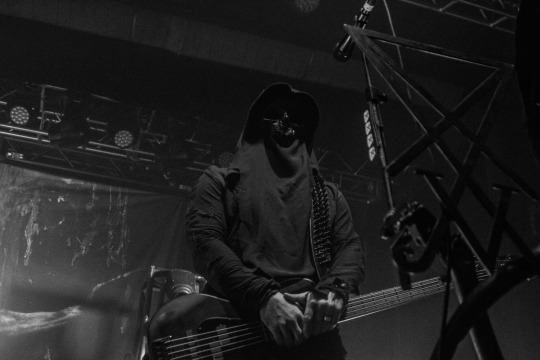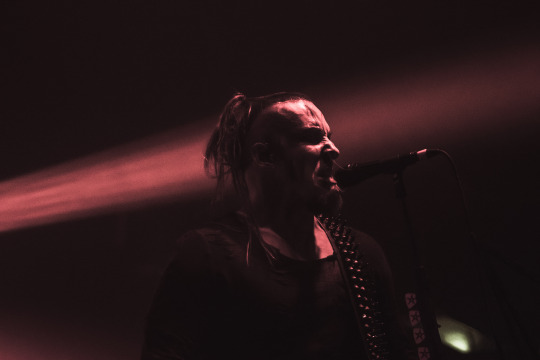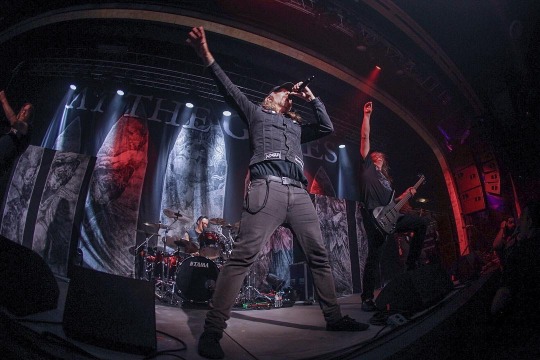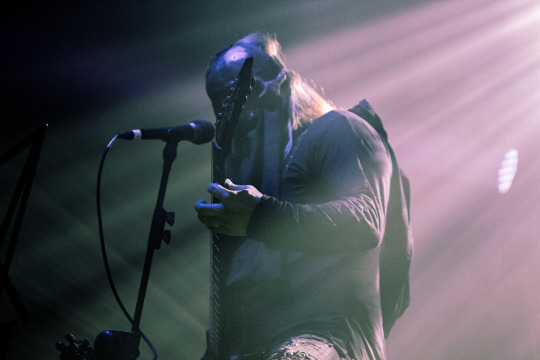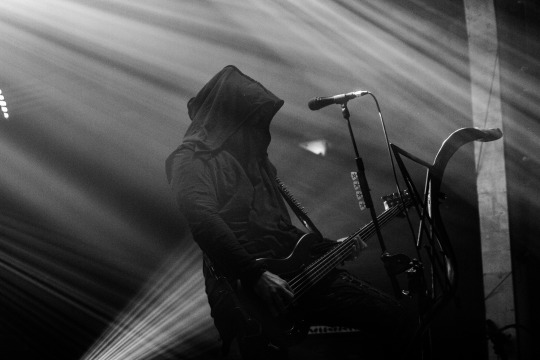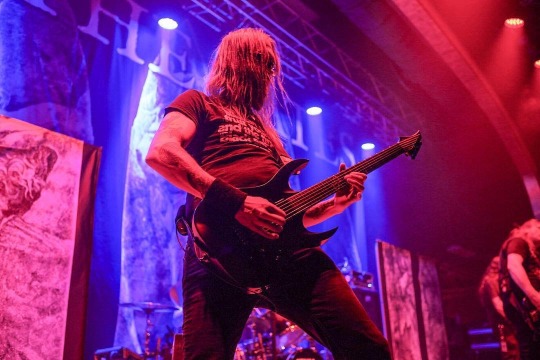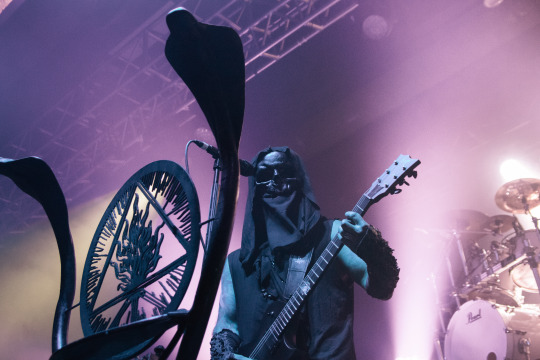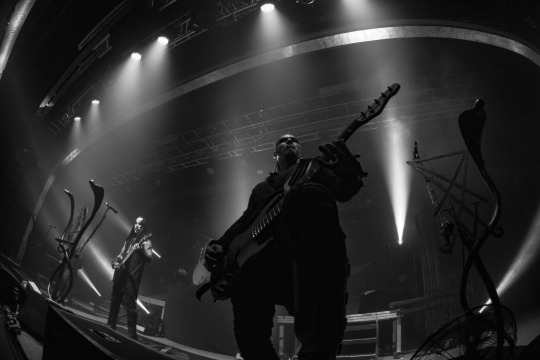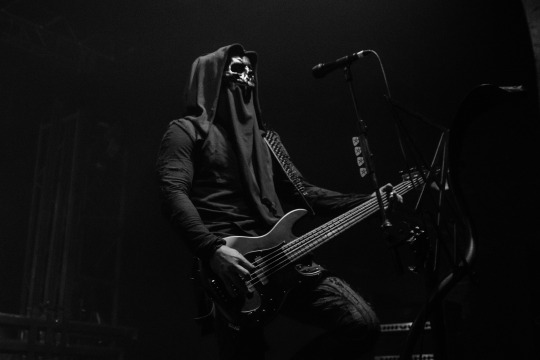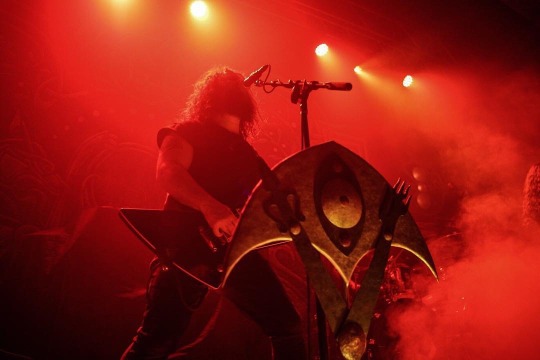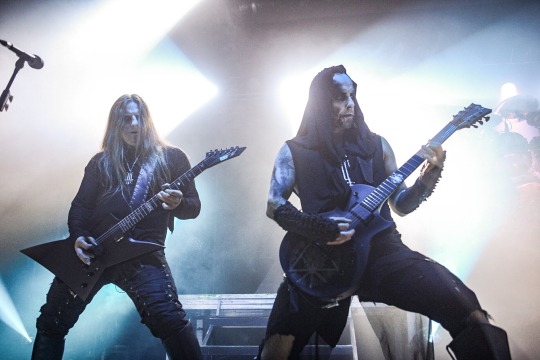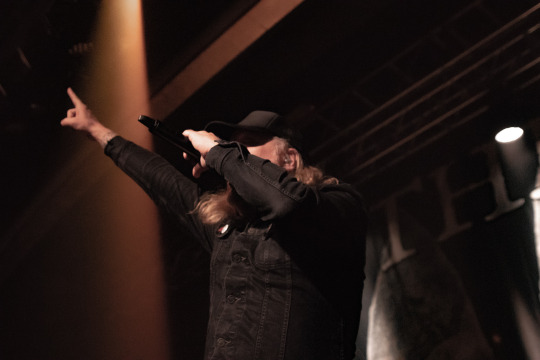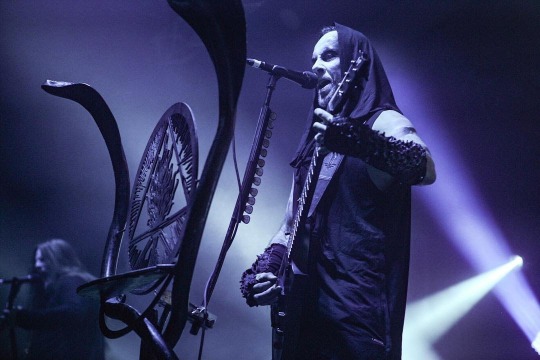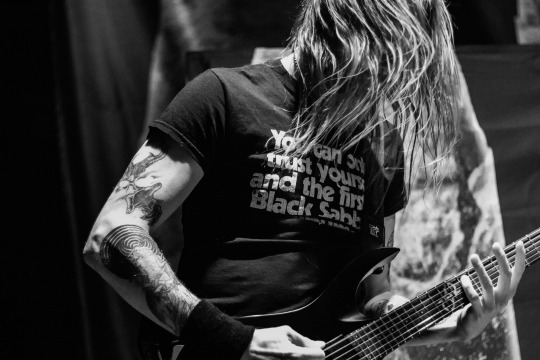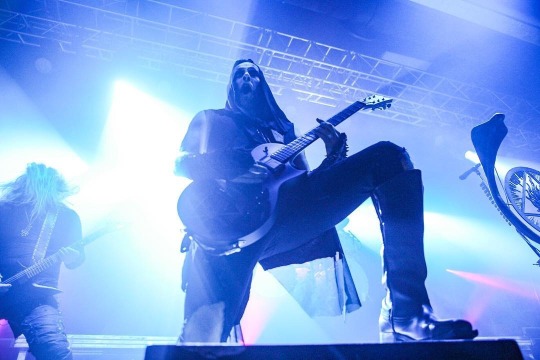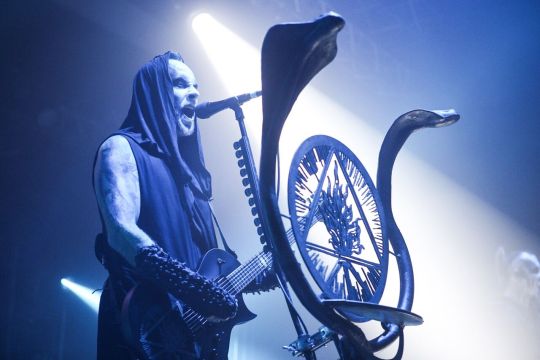
All photos by Kyle Dehn and Yeshua Flores
Very rarely does a band in their 27th year shock fans with new music. Generally, after 10-plus albums and countless tours across the globe, listeners have pretty much heard literally everything that band has to offer.
We mean, think about it: After doing something for over a quarter of a century, don’t you think it’d be easy to fall into some sort of monotonous routine?
Nevertheless, in some cases, on the band’s highly anticipated 11th album, that group is able to pull out something new, something dark and something fresh. That something is I Loved You At Your Darkest, aka Behemoth’s blasphemous offering of blistering yet thought-provoking blackened death metal.
Continuing where they left off with 2014′s critically acclaimed LP The Satanist, Behemoth have seemingly taken a left turn with their songwriting where, instead of beating you over the head sonically, their focus has now shifted to dynamics.
Don’t get us wrong, the album is still heavy. Songs like “Wolves ov Siberia,” “Angelvs XIII” and “We Are The Next 1000 Years” are as pulverizing as ever. But with exploratory tracks such as “Bartzabel,” “If Crucifixion Was Not Enough…” and “Havohej Pantocrator,” Behemoth is beginning to shine a light on a new layer of sound fans have yet to experience.
Now in order to fully digest this conceptual approach from the iconic Polish outfit, we sat down with the band’s fearless leader Nergal to dive deeper into I Loved You At Your Darkest as well as the act’s Noise Presents headliner with At The Gates and Wolves In The Throne Room.
To check out our intimate sitdown with the Behemoth vocalist/guitarist as well as our photo review from the band’s opening night in Phoenix, Arizona, be sure to look below. Afterward, make sure to grab tickets to their Ecclesia Diabolica North American tour here.
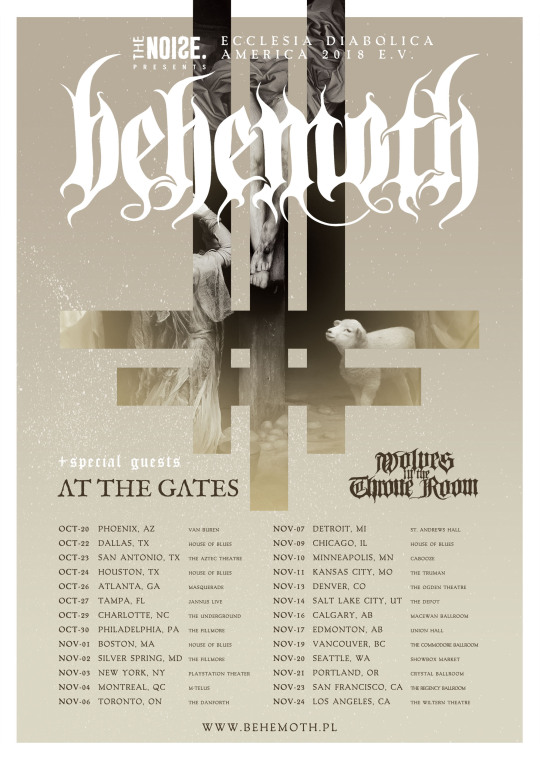
It’s the first night of tour supporting your new record I Loved You At Your Darkest. What are the feelings, emotions, nerves, etc. going into show number one?
Nergal: Well, I always get this rise of [nerves which are] kind of applied to every tour. There’s a lot of new pieces, you know, needing to get together nicely in order to pull off the whole production. So it’s pretty hectic. It’s kind of nervous but it’s very like ambitious nervous. It’s not distracted nervous, it’s like we’re excited. The adrenaline is up and we will be performing new songs for the first time ever tonight. So it’s always a high adrenaline rush.
About how many new songs on this tour do you think you’ll be doing? You don’t have to give it all the way but…
We’re playing five new songs which is pretty much half of the record including some other pieces. But the rest of the setlist is very crossover but I’d say that we’re focusing mainly on the recent albums because it just – you know, the setlist must be very coherent with where we are now as artists. Sometimes, [if] you just throw in some more ancient [songs, then] it just kind of blows up the conceptual approach to the show. So I really like to think about the show as a whole. It’s got to be very unified, it’s got to be very conceptual. It’s got to be very complete, so to say. That’s the right word to express that. So yeah, eventually something from The Satanist, something from Demonica to some stuff we’ve never played.
Wow.
I mean, yeah. There’s a song from Evangelion that people always like beg us, “Why you never play it?!” and it’s a very technical, super brutal song and I’m like “Okay, let’s do it.” So it’s a challenge to do it actually now, but it feels good.
So joining you on this tour is At The Gates who haven’t been a support band on a tour in over 20 years. What does that mean for you to have them supporting you out on this run?
I don’t really seem them as support. You know, their guests. Wolves In The Throne Room is a support band and they’re an amazing support band. At The Gates is basically a guest. The fact that they are below us, it doesn’t really change much. They are legends and good friends of ours and I’m super happy because it’s only a three-band bill but it really does the trick. People [are] really excited about that. Everyone is, “Holy fuck! What a cool combination of bands!” So because of the impact it made on people, we just decided to continue with this bill and do it in Europe as well.
Is At The Gates a band that has inspired or influenced you in any way?
Oh no, not us. I mean I’ve never really – I listened to them when I was a kid. I mean like I was 16 or 17 and I remember The Red In The Sky Is Ours album. It was cool. Then The Slaughter of the Soul, I like that. Terminal Spirit Disease was a cool record as well. But I remember like 10 years ago, I was in Australia and I somehow like rediscovered for myself Slaughter of the Soul and I was like, “Fuck! Such a great record and it’s only 30 minutes long.” It’s amazing and then, you know, what happened later or around that time – I’m not very good at history and old days, you know – but I remember this massive melodic death metal movement in the US. I mean, At The Gates should be getting like shitload of money and royalties for like all these American bands ripping them off and becoming huge while it was At The Gates that started that *mimics melodic guitar/drum pattern*. So it’s good to have like the originators and not imitators.
So let’s dive into the new record I Loved You At Your Darkest. You’ve been very busy talking about this record all over the globe. What do you think is the one thing that stood out most about this record that you find people keep asking you?
It’s a very multi-layered record and there’s a lot of diversity – more than ever. And what I hear the most from people is like, “Shit, this album is on repeat and every time I listen to it, I discover something new.” So I take it as a huge fucking compliment and I’m super happy that this is such a different record than The Satanist. In a way, it’s kind of continuing a similar direction but then again everybody’s so different and I hope it sounds fresh for people. There’s a lot of dynamics there and a lot of stuff that, you know, we’ve never played before like some of the tempos or some of the beats. It’s like, “Okay, let’s do it differently this time.” It felt very liberating to write this album because we just – it was a carte blanche for us. We were just starting – I mean, of course, in the back of your head you have your whole history and the whole discography is in your system. So automatically, you’re gonna release something that sounds similar to what you’ve done before. But it felt good to have little nuances here and there that are completely new to us.
Especially with where you guys are with your career with your 11th album. It’s good to be able to do new things and not just rehash the same stuff.
Oh absolutely. I mean, that’d be easy. I could do the record that’d be just – well, I’m smart enough to see what people expect [which] would be the easy way. But I’m not the easy way kind of person. I’m like, “Give me some challenge!” And you know what, when I look up to bands, on one hand, I’m [an] AC/DC fan or Manowar fan or Maiden fan – maybe that’s not really a good example. The best [example] is AC/DC. I’ve heard they’re in the studio and I really hope they’re gonna record another great record that sounds just like AC/DC – don’t put any new elements, I don’t want it. But then, if I hear that Marilyn Manson or Rammstein or Nine Inch Nails or Metallica is doing a new album, I’m like, “Okay, surprise me.” Because these bands do that. Or Depeche Mode [too], surprise me. And that’s what they do every time. I’m not saying they’re putting out the best records but they always challenge themselves and they always try to redefine themselves and bring something fresh to the table. Sometimes they succeed big time, the other times I’m like, “Ummm… I’m not sure.” But I always respect the fact that they never do the same thing over and over again. I hope that Behemoth being a part of – let’s face the truth, a very conservative genre, which heavy metal is. Within that genre, within that cocoon, we still manage to expand the boundaries and just [expand] the limits and add tweaks to make it sound fresh. That’s the point.
That’s interesting you bring that up. Does it frustrate you being in the metal genre where, if you guys release a more melodic song or a slower song, fans will get upset because they want “heavy” and “brutal” 24/7?
No, no. Because I just can’t stop being myself… When [you] start making a song, you start from a very egotistical point of view. It’s just me, the guitar and words that I need to put together to feel completed. Trust me, when I’m playing, I’m not like, “Hmmm… will people dig it?” [laughs]. No, no, no. I mean, it must be me. I’m selling you, I’m giving you a piece of me. It can be a liver, it can be a kidney. Just imagine, I’m just fucking tearing out like a piece of raw meat in a form of a song and it’s a piece of me. If you like it or if you don’t, I have no control over that. All I can promise is, “Hey, it’s honest because it’s a piece of me.” So if you dig it, cool. If you don’t, still okay.
Yeah, and there are still plenty of other albums for you to listen to if you’re looking for that “heavy.”
Absolutely! [Laughs] The market is overwhelmed with amazingness. It’s all there. I mean, sure “Bartzabel” is not the most brutal song we’ve written, it’s probably the most mellow song. And there’s people that are bitching, “Oh he’s singing! It’s not enough gain on guitars!” And I’m like, “Just go and get some high gain record, no problem. I’m not forcing you to [listen].” There’s so much diversity on the record, that if you want something like extremely wild and crazy, you’ll find it. Just listen to “Angelvs XIII” and “We Are The Next Thousand Years,” “Wolves ov Siberia,” fucking primordial songs, brutal crazy. And then there’s parts that are just mellow and surprising. We just kind of, yeah, just taking it a bit more mellow – but I have no problems with showing that whatsoever. And then it’s like, oh just look up to some other bands like, let’s say I am Bathory fan, okay? When people have problems coping with the new [Behemoth] record I’m like, “Okay, so umm…” I try to play with people, “so which Bathory record is better? Under The Sign of the Black Mark, Blood Fire Death or Hammerheart?” And they’re all like, “uhhhh…” I mean, I am a Bathory fan and I know they’re equally great. They’re just totally different planets, you know what I mean? All these classic Bathory records, every record is different and I worship them equally. Sometimes what I crave for is the rawness of The Return, the second record. And the other time, you know what, I just want to go mellow and epic with Twilight of the Gods. And it’s like, “Holy fuck! That’s almost [like a] rock record.” It’s beautifully arranged, it sounds huge. It’s just different. I mean, I worship them equally. So I would like people to see Behemoth’s career and Behemoth’s discography the same way – that it doesn’t necessarily need to be, like, always the fastest and the heaviest because I really like people to see Behemoth’s music as a mirror of what life is and life with all these dynamics that it just carries along and it’s waves that go big and then just goes back. I like it that way.
That’s a great way to put it. Not everyone is angry 24/7 so sometimes you want to listen to slower songs and you guys are providing that.
Exactly! And that’s how we build up the setlist as well. It’s never gonna be like boom boom boom like crazy. It’s a lot of dynamics. It really takes [a lot], I’m still in the process of learning that. But now, I know and I think I’m better and better with every next record with materializing this ancient formula that there is no noise without complete quietness. There is no – I mean, the song won’t be fast if you don’t play very slow before or afterward. You know what I mean? It’s like you gotta just shut the fuck up before you get loud because that’s what’s gonna make the noise even louder and even crazier. You know what I mean? So it’s all really how you play with the dynamics. That’s what’s gonna do the trick because if you play 40 minutes of 260 or 280 tempos, after five minutes it’s going to get dull and flat so it’s not going to be fast anymore. I mean, that’s a good example of what you just said. You know, no one is angry 24 hours a day. So instead of just being irritated for 24 hours, you know, just be relaxed. If you have a bad moment, just fucking scream for like three minutes. And it’s gonna make your point, you know [laughs].
After releasing The Satanist, you mentioned there might not be another Behemoth record. You said you were just done after 10 albums. You felt like you said everything that needed to be said in a Behemoth format. After experimenting with I Loved You At Your Darkest, do you have ideas already brewing for where Behemoth can go next?
That’s funny you ask that. I went to grab a coffee earlier today and walking back to the venue I already had a new song in my head. I forgot it now. Too bad because I think it was a really cool melody and cool structure of two sections put together and I thought, “Oh shit, this could be amazing.” I had that [idea] and then I lost it because there was some stuff to do here. But it’s cool, I mean, it’s gonna come back. But I’m thinking, well you never know, maybe this is the last Behemoth record. I’m not teasing, I’m just being realistic. I’m living my life now, I’m fucking enjoying the first day of tour and I want to put on the best show I can. I try to be present here and now and squeeze all those juices of I Loved You At Your Darkest and just celebrate it. And then, you know, the highest hopes [are] that next time we come around, we do something again that is I hope exciting for us and for people. But there’s no guarantee for that. But unlike The Satanist cycle, yes I’m surprised there’s so much music in me now. And I’m thinking maybe, I don’t know if it’s gonna happen, but maybe, I wouldn’t be surprised if unlike all the previous routines, from like previous years, this time around we just get in the studio next year just to nail four new ideas – like demos maybe just to see where we are and where we’re going. And maybe do the record [within] the next two years. And I don’t really want to just, this what I’ve said, I mean, because I Loved You At Your Darkest is what it is because we took a long time off, we toured, I did a record with Me And That Man, we took some time off, you know what I mean? And we lived our lives, we get some experience so we can hear it on the record that is different. But I don’t want to do it for any cost. I mean, if it feels like, “Hey, I got fucking new exciting ideas, let’s do them,” we’ll do it.
Do you think it’s safe to say working on Me And That Man and getting to try something new helped save Behemoth?
Yeah, absolutely. I mean, it’s something that I needed to balance my life out. To just get my balance creativity-wise and stuff. I did that. And when I came back to the Behemoth camp, I was hungry again.
